Christchurch earthquake: The battle to rebuild, five years on
- Published
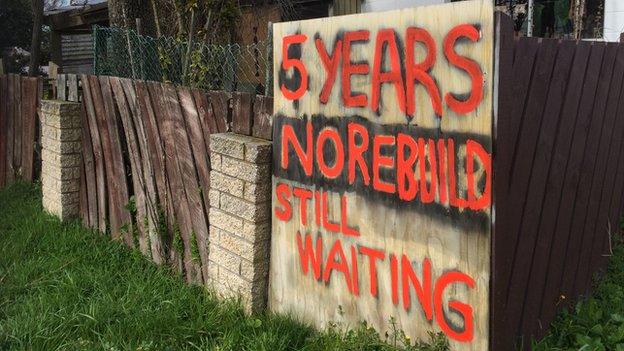
It has been five years since a major earthquake hit the New Zealand city of Christchurch, but thousands of residents are still waiting for their homes to be repaired or rebuilt.
Several residents have told BBC News that they are "in limbo" and face increasing financial problems after years of delays and disputes about insurance claims.
The insurance industry says a series of aftershocks, and difficulty in working with the government's earthquake agency, has slowed it down.
A magnitude 6.3 quake struck directly under Christchurch at 12:51 on 22 February 2011, killing 185 people and destroying or damaging around 170,000 buildings.
'Pure frustration'
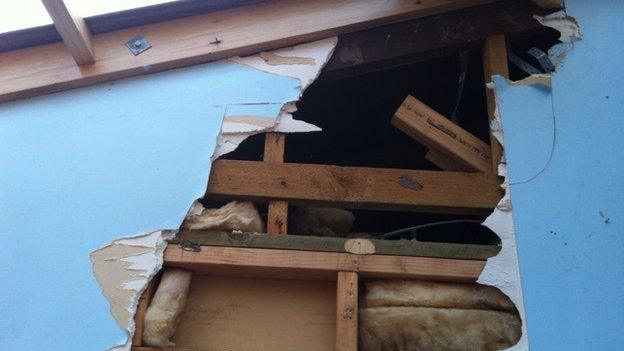
Tom Davies and his wife lived in their damaged house for three years before moving out
Tom Davies and his wife had to move out of their house in Christchurch's Mt Pleasant suburb when it was declared unsafe two years ago.
"We have cracks you can crawl through, roof leaks, a spring running through the basement, walls leaning downhill, asbestos and electrics that pose a risk of fire or electrocution," he says.
Mr Davies says that five years after the earthquake little progress has been made in settling the insurance claim.
New Zealand has a two-tier insurance system that deals with natural disasters.
The Earthquake Commission, external (EQC), a government agency, covers damages to residential homes of up to NZ$100,000 (£46,000; $66,000).
More expensive repairs and rebuilds are handled by people's private insurance companies.
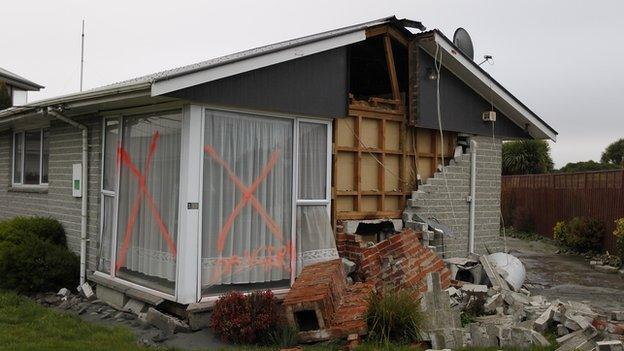
Around 170,000 properties were damaged or destroyed in the February 2011 quake
The Davies family's claim was handed to its insurance company in February 2014.
"Five years on, we are no further forward," Mr Davies says.
An independent surveyor has estimated the damage to the house at NZ$800,000.
In the meantime, Mr Davies and his wife have bought another house to live in temporarily, but they are still paying for the mortgage, rates and insurance on their damaged property.
"Financially, we are prisoners because we are tied to that house. We can't walk away from a house that is our life's investment, that is our home and our future," he says.
"Two years of paying two mortgages, insurances and sets of rates is simply crippling."
'Rotting walls'
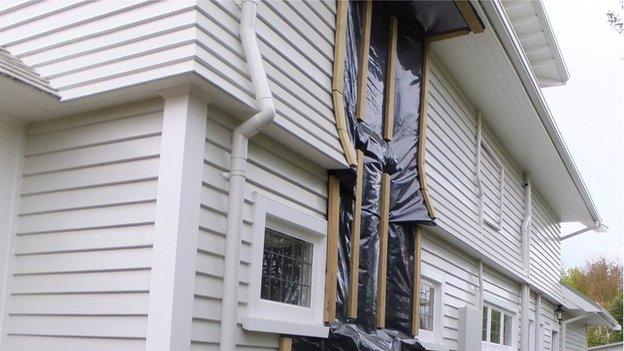
Plastic is covering a hole on one side of Shona Senior's house
According to figures provided by the insurance industry, around 4,600 insurance claims have not been settled yet.
Shona Senior still lives in her timber-framed house in Christchurch, even though the property was severely damaged in an earlier tremor in 2010 as well as the February 2011 quake.
"We cannot use one living room and one bedroom for much of the year because of big holes in the outside of the house," she says.
"Damp is permeating the house and our home, which was once in beautiful condition, is now rotting."
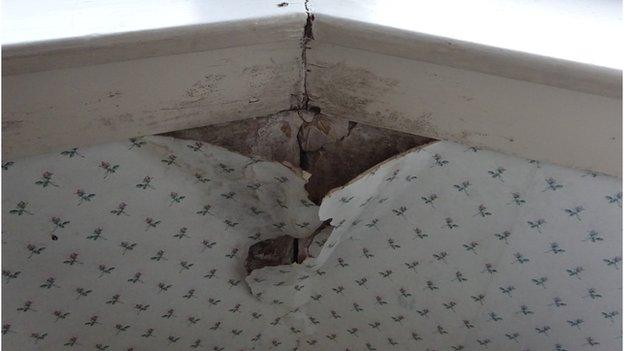
A windowsill damaged by water and mould in Shona Senior's house
Shona owns two damaged properties and says she was forced to accept an under-value settlement for her other house because of the continuing dispute.
"We settled for less than our entitlement because of the financial stress of maintaining two houses and having to pay thousands of dollars for our own expert reports," she explains.
'Most claims settled'
Almost nine out of 10 claims relating to private properties have been settled, says the Insurance Council New Zealand, external (ICNZ), an industry body representing the country's insurers.
"I said three years ago that we will have the vast majority of claims settled by the end of this year and we are well on track for that," says ICNZ chief executive Tim Grafton.
But he says a small number of claims either newly-transferred from the EQC or slowed down by court cases will drag over to 2017.
"We continue to have hundreds of properties transferred across to us from the EQC," he explains.
"That explains why some properties have not been processed."
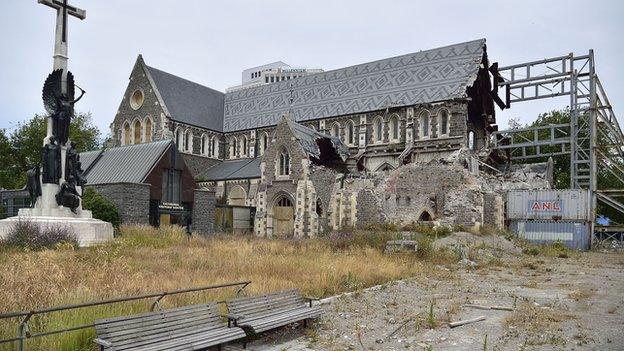
Several historic buildings were damaged in the quake, including Christchurch's cathedral
'Taking a toll'
Jeremy Prendeville's house stands in one of the worst-hit areas of New Zealand's second-biggest city.
His neighbourhood was "red zoned" after the quake, meaning it was considered unlikely houses could be rebuilt there.
He says he developed post traumatic stress disorder (PTSD) as a result of his uncertainty about reaching adequate settlement.
"This house was my stepping stone. I was a young man building my life towards retirement," he says.
"Now I still can't be sure if this will leave me better or worse off."
Thousands of people took part in a rally in central Christchurch, external on Sunday to highlight the continuing insurance disputes.
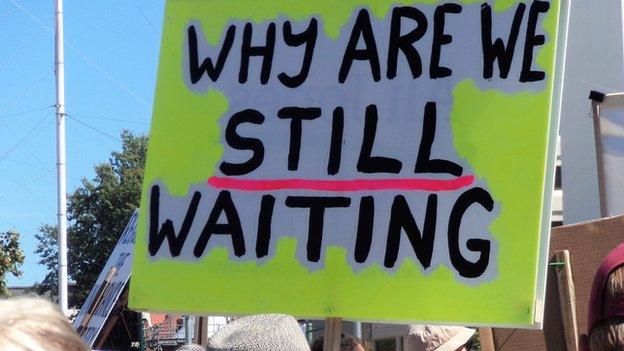
Megan Woods, earthquake recovery spokeswoman for New Zealand's opposition Labour party, was one of the speakers at the event.
She says recovery efforts after the Christchurch quake were slower than after comparable natural disasters in Chile and Japan, particularly in repairing and rebuilding residences.
"Not being able to get settled has taken a toll on people. It has been very messy for them to deal with both the ECQ and private insurers," she told BBC News.
"We think the government should have taken a much more active role and not allow private insurers to do what they want."
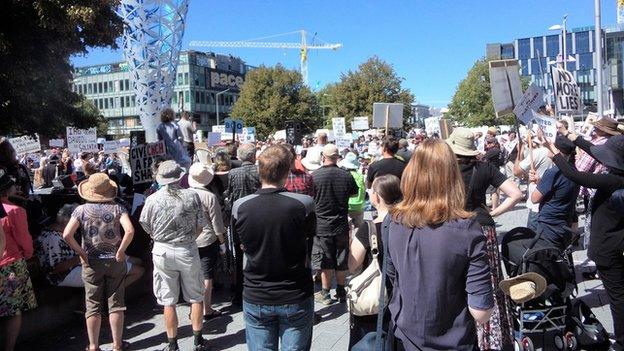
Several hundred protesters voiced their anger about delayed rebuilds at a rally in Christchurch
- Published22 February 2011
- Published22 February 2011
- Published22 February 2011